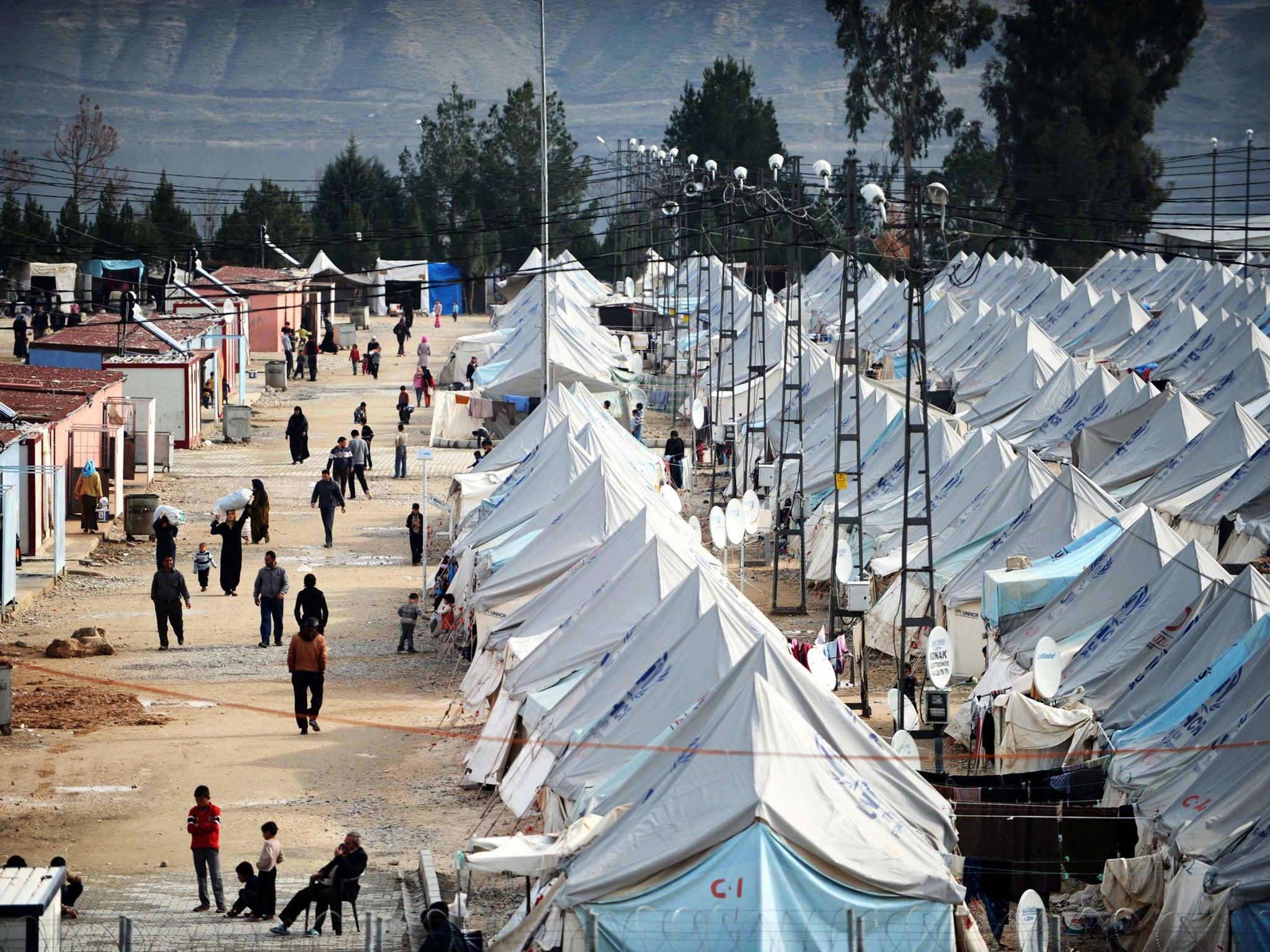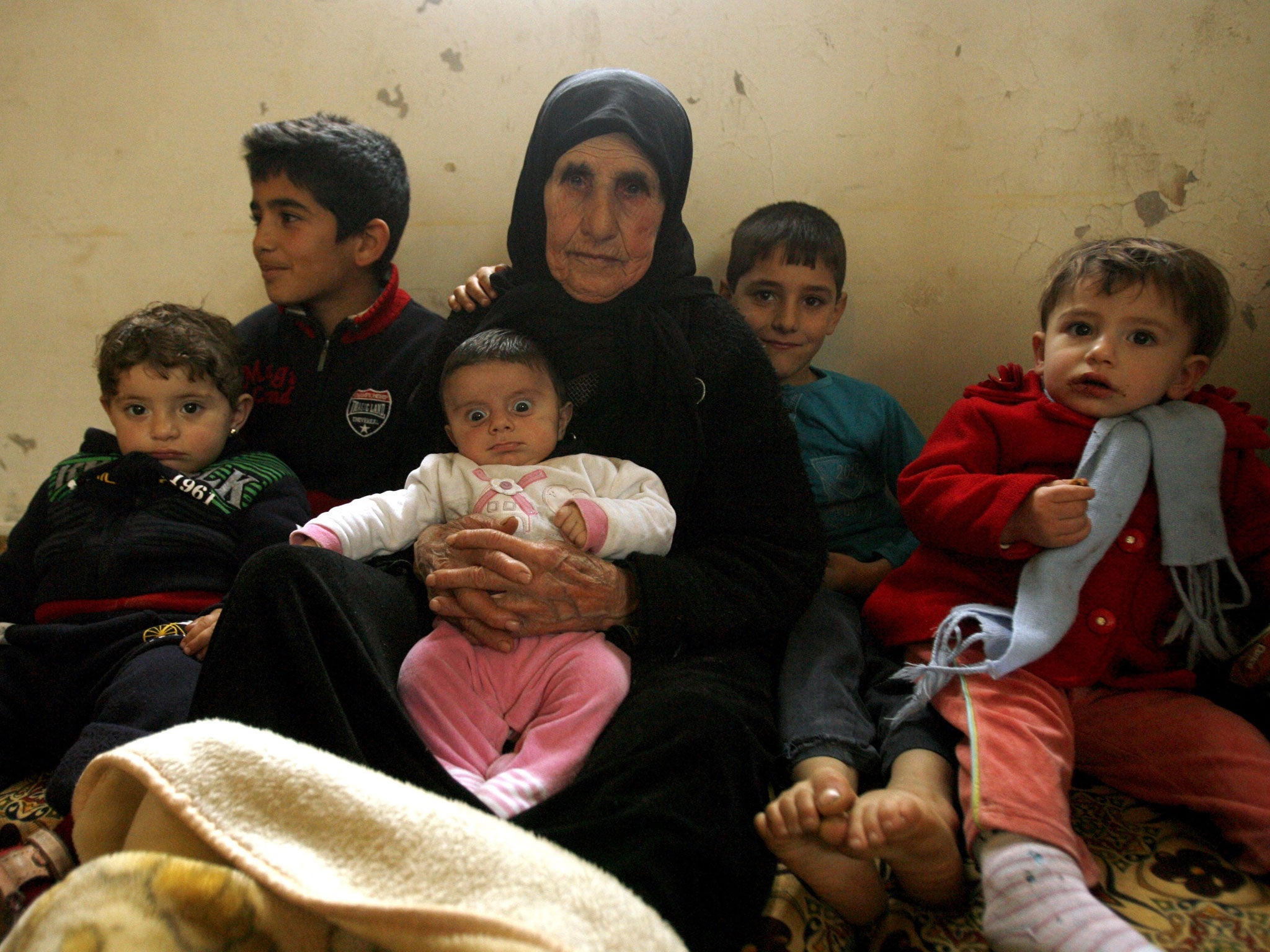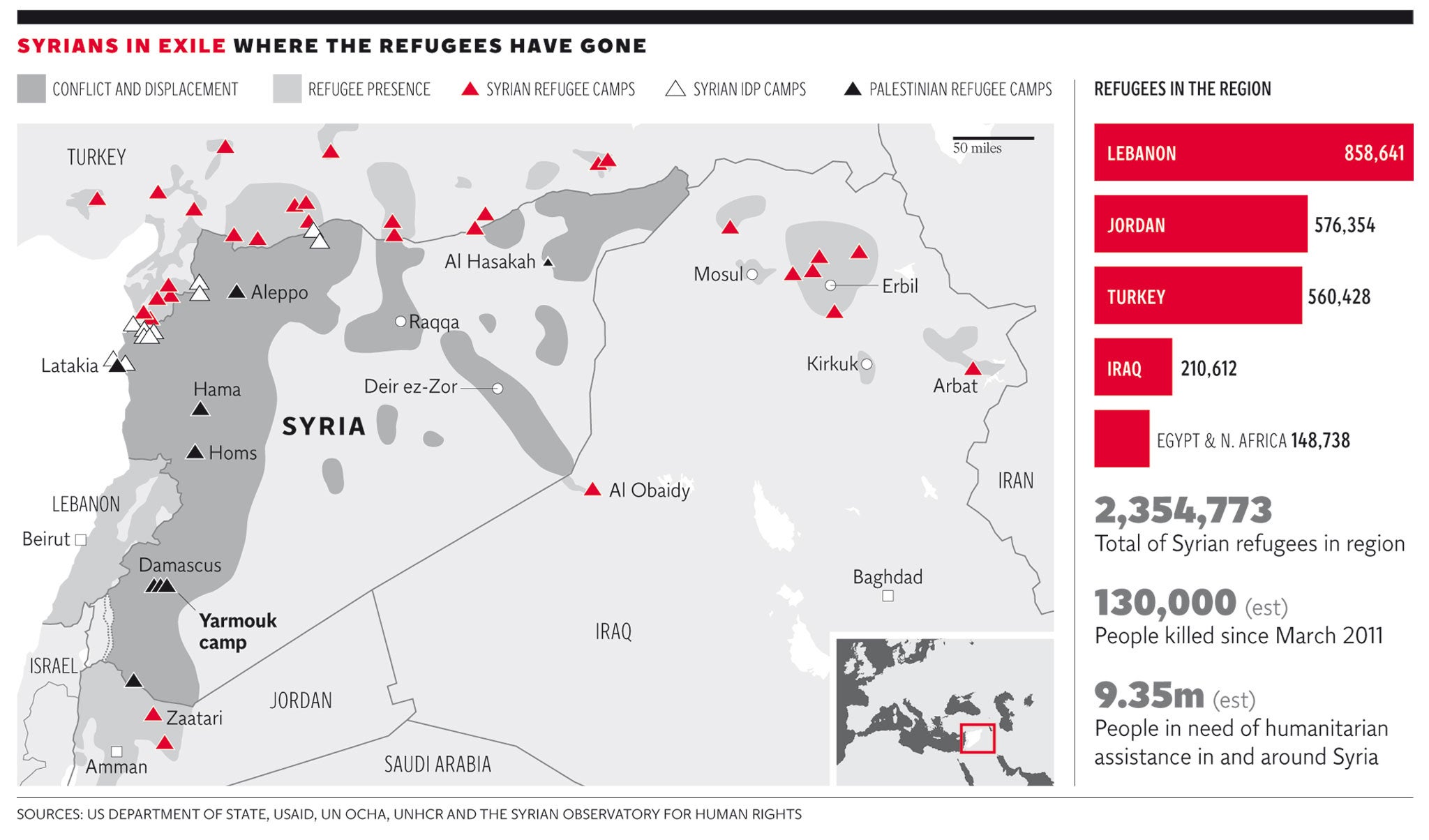Exclusive: A call of duty - 25 leading charities urge PM to open Britain’s door to its share of Syria's most vulnerable refugees
As the plight of its displaced civilians grows more desperate still, the organisations call on David Cameron to 'transform the lives' of those most affected by the civil war

Your support helps us to tell the story
From reproductive rights to climate change to Big Tech, The Independent is on the ground when the story is developing. Whether it's investigating the financials of Elon Musk's pro-Trump PAC or producing our latest documentary, 'The A Word', which shines a light on the American women fighting for reproductive rights, we know how important it is to parse out the facts from the messaging.
At such a critical moment in US history, we need reporters on the ground. Your donation allows us to keep sending journalists to speak to both sides of the story.
The Independent is trusted by Americans across the entire political spectrum. And unlike many other quality news outlets, we choose not to lock Americans out of our reporting and analysis with paywalls. We believe quality journalism should be available to everyone, paid for by those who can afford it.
Your support makes all the difference.Britain must accept its “shared responsibility” for Syria’s refugees and join a UN scheme to welcome those fleeing the conflict, a coalition of 25 aid agencies and charities tells David Cameron.
In an open letter published in The Independent, the organisations call on the Prime Minister to “transform the lives” of Syrians displaced by the civil war in their country by committing the UK to participate in the UNHCR’s global resettlement programme.
More than two million refugees have been registered by the UN High Commissioner for Refugees in Syria’s four neighbouring countries, in what has been labelled the “defining humanitarian crisis of our time”.
Western governments have been asked to accept 30,000 of the most vulnerable refugees from the region under the rehousing scheme. But Britain has so far refused to take part, instead emphasising the importance of the substantial financial aid it is offering.
The letter is the first time that major aid agencies, including Oxfam and Save the Children, have gone public with calls for the resettlement of Syrian refugees to the UK.
Among the signatories to the letter are the directors and chief executives of Amnesty International UK, Action Aid, Cafod, Muslim Aid, War Child, the Refugee Council, Asylum Aid, Freedom from Torture, Refugee Action and Islamic Relief Worldwide.
Raising the “catastrophic” prospect that countries neighbouring Syria could begin to refuse civilians an escape route, the groups ask: “How can we call on Syria’s neighbours to keep their borders open to refugees if we keep our own under lock and key?”
The Independent understands there is growing concern among senior figures in the UNHCR and other organisations active in the region that if countries such as Britain don’t “step up to the plate” to accept refugees, states such as Lebanon and Jordan may consider turning them away.
If the borders are closed there aid agencies fear displaced Syrians will be trapped in terrible conditions inside the country’s internal refugee camps.
The Independent reported on Thursday on the conditions in the Yarmouk refugee camp near Damascus, where 18,000 people live cut off from supplies and medical aid and people are reportedly eating grass as well as cat and dog meat.

The Refugee Council has warned that countries in the region “may wave people through and encourage them to find other routes to Europe” if the UNHCR resettlement programme is not implemented.
Syria’s neighbours are coming under increasing difficulty from the number of refugees entering their territory. Close to a million Syrian refugees are scattered all across Lebanon. They are never far from sight; scruffy children begging at the capital’s bars, polishing shoes or selling lottery tickets.
Thousands live in makeshift tents. Some have little more than a dirt floor to sleep on. A fifth of the population of Lebanon is now Syrian; proportionately, this is the equivalent of the entirety of Greece and Albania moving to the UK.
Maurice Wren, chief executive of the Refugee Council, said: “The situation in Syria is appreciably deteriorating, and that’s why we think it has become increasingly perverse for Government to say the only answer is to provide more financial assistance.
“We’ve already seen an element of people voting with their feet because they don’t like the conditions in the refugee camps [in Lebanon and Jordan]. And we’ve seen an increase in the number of Syrians coming through the well-established people-smuggling routes across the Mediterranean and through Turkey.”
The UNHCR, European Commission and Refugee Council have all urged the British government to go further than donating aid and accept the temporary resettlement of Syrian refugees inside the UK.
MPs from the three main parties have given their support to today’s open letter, despite Mr Cameron and the Deputy Prime Minister Nick Clegg’s resistance to the idea. The Government argues the UK has played its part by donating £600m to the UN’s appeal, the country’s biggest-ever response to a humanitarian crisis. Ministers insist this is the most effective way of helping the Syrian people.
Mr Clegg said last week that Britain had already accepted about 1,500 asylum-seekers from Syria. However, the Deputy Prime Minister’s comments were labelled as “evasive and disingenuous” by the Refugee Council, which warned that the 2.3 million refugees who have fled Syria have little prospect of being able to get to Britain to claim asylum.

Kate Allen, director of Amnesty International UK and a signatory to today’s letter, said: “It’s to our shame that we have watched this human tragedy unfold and have failed to offer to resettle a single refugee from the overflowing camps.”
Mr Clegg faced pressure from within his own party to change his line. Sir Menzies Campbell, the party’s former leader, said: “The UK has rightly led financial efforts to help Syrian refugees but surely we can afford to be more generous.
“When other allies like the US, France and Germany are admitting up to 10,000 refugees, why can’t we do the same, or are we now so intimidated by Ukip that we have lost our humanity?”
Labour has led calls for Britain to accept between 400-500 Syrian refugees. Yvette Cooper, the shadow Home Secretary, said: “France, Germany, Austria, Finland, Holland, Ireland and others have all agreed to do their bit. People will feel ashamed that our government is one of the only ones to refuse to help. It is immoral to stand aside and refuse to help when countries as far afield as Canada and Australia are willing to.”
Many Conservative MPs are not convinced Britain should to open its doors to hundreds of refugees. But Brooks Newmark, Tory MP for Braintree, who has just returned from a three-day visit to camps on the Syrian-Turkish border, said he was “sympathetic to the idea” of accepting a limited number.
“I would support bringing to this country people who cannot get medical support – such as babies, small children, the severely injured,” he said.
The UNHCR High Commissioner Antonio Guterres said the international community needed to assume “a true attitude of burden-sharing”. He said: “It is unacceptable to see Syrian refugees drowning and dying in the Mediterranean sea or being pushed back from borders.”
The letter
Dear Prime Minister,
We are writing to you on behalf of the most vulnerable refugees from Syria who are struggling to survive in crowded refugee camps and makeshift shelters. They have witnessed and survived unimaginable horrors. Meanwhile Syrians living in the UK are desperately worried about their families.
The UK deserves credit for its leadership in providing assistance to refugees in the region, including £600m in aid, helping millions of families survive. However, given the scale and the gravity of the humanitarian crisis unfolding across the region, we would urge the UK to join the 18 other states participating in UNHCR’s global resettlement programme. Those with family already in the UK should be allowed to reunite with their loved ones.
UNHCR has appealed for Western governments to accept 30,000 of the most vulnerable refugees from the region. This would include women at risk, children who are in need of special assistance, vulnerable older adults and torture survivors who will simply struggle to survive in the harsh conditions in the region. We must play our part in offering them a place of safety.
This number may seem like a drop in the ocean, but it would transform the lives of each person resettled and help countries like Lebanon and Jordan who are already feeling the strain. In Lebanon, one of the most densely populated countries in the world, a fifth of the population are now Syrian refugees.
People in neighbouring states have shown incredible compassion and opened their homes to hundreds of thousands of people but we all have a shared responsibility. It would be catastrophic if the neighbouring countries closed their borders to the thousands of people who flee the conflict every day. Yet how can we call on Syria’s neighbours to keep their borders open to refugees if we keep our own under lock and key?
Yours sincerely,
Maurice Wren, CEO, Refugee Council
Kate Allen, director, Amnesty International
Richard Miller, executive director, ActionAid
Wayne Myslik, CEO, Asylum Aid
Chris Bain, director, Cafod
Paul Valentin, international director, Christian Aid
Tiffy Allen, national coordinator, City of Sanctuary
Chris Doyle, director, Council for Arab-British Understanding
Keith Best, CEO, Freedom from Torture
Faddy Sahloul, chairman, Hand in Hand for Syria
Dr Mohamed Ashmawey, CEO, Islamic Relief Worldwide
Peter Balleis SJ, international director, Jesuit Refugee Service
Dr Edie Friedman, executive director, Jewish Council for Racial Equality
Syed Sharfuddin, CEO, Muslim Aid
Jim Steinke, CEO, Northern Refugee Centre
Mohamed Nasreldin, CEO, North of England Refugee Service
Mark Goldring, CEO, Oxfam
Dave Garrett, CEO, Refugee Action
Michel Gabaudan, president, Refugees International
Amy Lythgoe, chair of trustees, Refugee Welcome Trust
Justin Forsyth, CEO, Save the Children
John Wilkes, CEO, Scottish Refugee Council
Emma Williams, CEO, Student Action for Refugees
Rob Williams, CEO, War Child
Salah Mohamed, CEO, Welsh Refugee Council
‘War crime’: Yarmouk’s aid blockade
The UN’s top human-rights official says the repeated obstruction of convoys trying to resupply the Yarmouk Palestinian refugee camp in Syria may amount to a war crime.
The UN High Commissioner for Human Rights Navi Pillay said numerous attempts by the UN and other organisations over the past four months to deliver aid to the 18,000 people in the camp have been thwarted.
The siege of Yarmouk, highlighted in Thursday’s Independent, has led to more than 50 hunger-related deaths since October. The blockade by Syrian government forces has been in place for over a year, and civilians have borne the brunt of fighting between the government and rebels.
Ms Pillay said in a statement that badly needed food and medical aid is not reaching malnourished children, women and elderly people close to starvation because of “a quagmire between besieging Syrian government forces and affiliated militias surrounding the Yarmouk camp, as well as anti-government armed groups operating inside”.
Join our commenting forum
Join thought-provoking conversations, follow other Independent readers and see their replies
Comments